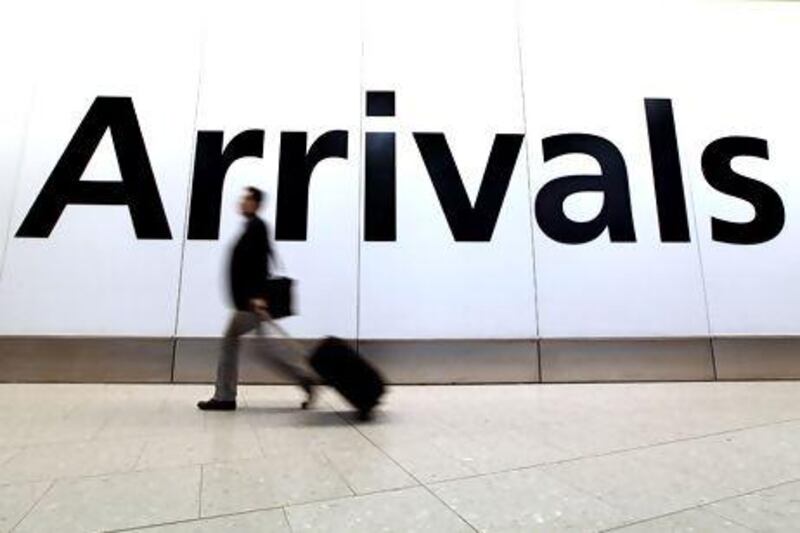Indians have reacted with outrage, confusion and disbelief at the British government's reported plans to make visitors from the subcontinent pay a cash bond to enter the country.
A pilot project designed to curb immigration abuse, which comes into effect from November, groups India along with other "high risk" countries including Pakistan, Bangladesh, Nigeria and Ghana, forcing some visitors on a six-month visa from those nations to pay a £3,000 (Dh16,760) deposit, according to reports in the British media.
Many fear the measures could harm political, trade, tourism, and business relations between India and the United Kingdom.
"While we are still to fully see the implications of this move by the UK government, if there is any truth to this, it would be a dampener to an otherwise flourishing relationship between India and the UK," said Naina Lal Kidwai, the president of the Federation of Indian Chambers of Commerce and Industry.
"We need to ensure that people to people interactions that form the basis of robust national relationships are not impacted. We hope that the UK government will have a rethink on the same, taking cognisance of the full implications."
UK Home Secretary Theresa May defended the "selective" approach to migration as the issue of "overstayers" is one of the biggest challenges facing the immigration system.
A No 10 spokesman said the government was "looking at ways of deterring overstaying and bonds are an option".
There are 700 Indian companies in the UK and many more have significant interests in the country, ranging from small businesses to the heavyweight conglomerate Tata Group.
Seventy-one Indian companies are listed on the London Stock Exchange, according to a recent report by the High Commission of India in London.
Two-way merchandise trade between the two countries totalled £10.87 billion last year, down from £11.79bn during the previous year, according to statistics from the UK government.
"A high risk status for visas for Indian visitors to the UK is 180 degrees opposite to prime minister David Cameron's emphasis on a special relationship with India," said Vindi Banga, the chairman of the Indian chambers of commerce UK advisory group. "This move will adversely impact students, tourists and business alike."
In a visit to India in February, Mr Cameron made great efforts to boost ties between the two countries, announcing a same-day visa service for Indian business travellers. Increased business relations between the UK and India could help to provide a much needed boost to both economies.
The UK economy grew at just 0.3 per cent in the first quarter of this year, narrowly avoiding a triple-dip recession. India's GDP growth slowed to a decade low of 5 per cent in the last financial year, well below the levels of about 8 per cent that the developing country requires to provide jobs for its burgeoning population.
The Confederation of Indian Industry describes the cash bond as "highly discriminatory and very unfortunate".
"The suggested changes are not only discriminatory they are also against the 'special relationship' publicised by the UK government," it said. "We share the UK's concern on illegal immigration but surely there are other more effective and non-discriminatory ways to put a check on it.
"Industry in India is disappointed by the way the immigration rules in UK have been changing over the last few years. [The confederation] strongly feels that such blanket rules for visas will negatively affect not only businesses, especially small businesses, it will also further bring down the number of students going to UK for higher studies and affect the tourism inflow from India to UK.
"This will also not help the cause of early conclusion of EU-India free trade agreement, for which both the parties are committed."
India and the European Union are in free-trade-agreement negotiations to boost trade in goods, services, and investment. Total trade between the India and the EU increased from €28.6bn (Dh136.64bn) in 2003 to €79.9bn in 2011, according to figures from the European Commission.
Tourism from India to the UK is also expected to be hit.
"It's not going help the UK's tourism industry or the UK economy at all," said Iqbal Mulla, the president of the Travel Agents Association of India. "If you want to put some restrictions, obviously business and investment in UK will be impacted.
"People who want to explore the possibility of having business relationships will get slowed down."
The UK's tourism industry has put great efforts to attract more visitors from India.
With growing wealth in the subcontinent and more and more Indians heading overseas, India is considered a particularly attractive target market.
Indians made almost 10 million outbound visits in 2010, with Britain receiving 371,000 visitors from the country, meaning that the UK was the 11th most visited destination by Indian residents, according to VisitBritain.
"VisitBritain research suggests that the number of annual visits to Britain from [India] has the potential to almost double by 2020, which could result in nearly 800,000 visits a year," the agency said. "A typical visit to Britain from India generates £980 with visitors tending to stay for longer periods of time due to a dominance of visits to friends and relatives already living in the UK."
Analysts are equally perplexed by the move.
"I find this very regressive for globalisation and international commerce," said Kamal Sen, the president and chief executive of Cogitaas, a consultancy specialising in strategy and planning.
Other countries,, Mr Sen said, were actively trying to attract immigrants to boost their economies. "US and other countries are duly recognising the positive contributions of immigrants and passing bills to encourage educated and technically qualified immigrants."





